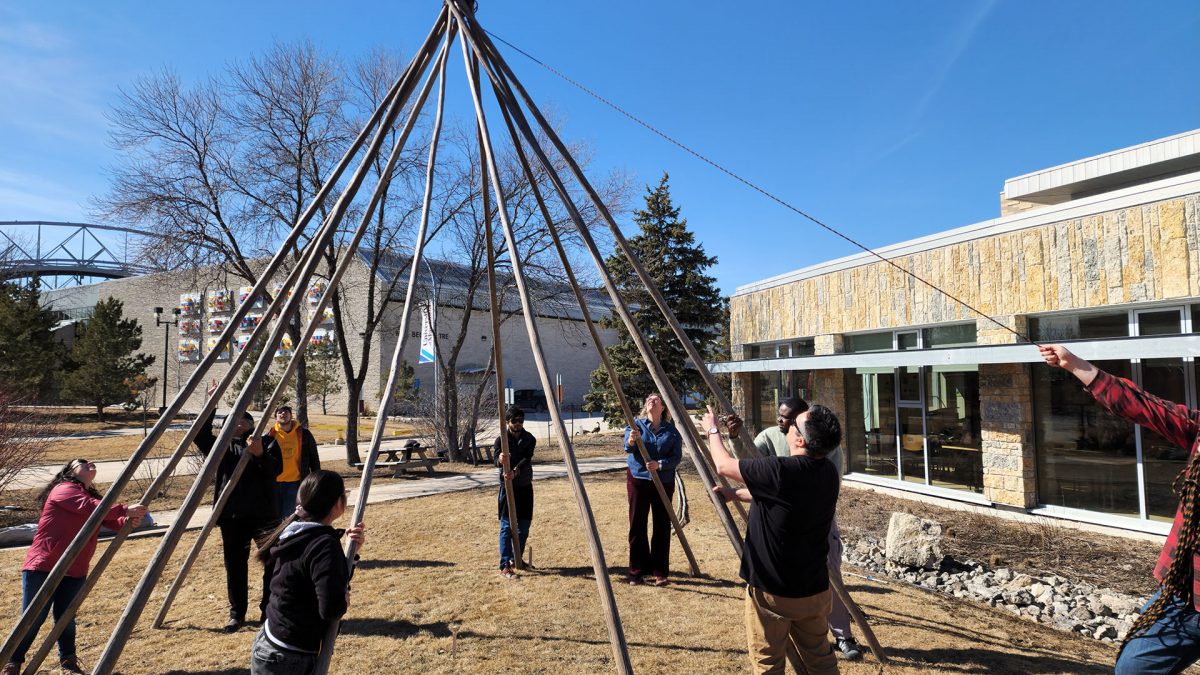
Decolonizing and Indigenizing engineering education
The Price Faculty of Engineering continues in its initiative for positive change with the course, ENG 4100: Contemporary Topics in Engineering Practice: Decolonizing and Indigenizing Engineering. Launched in Winter 2022, the course brings together Indigenous and non-Indigenous engineering students to reflect on the ways that engineering can emphasize and further incorporate Indigenous Peoples and their worldviews into the profession. The course is part of the faculty’s response to the Truth and Reconciliation Commission of Canada’s Calls to Action. Through this course, students are equipped with the knowledges and perspectives necessary to collaborate positively with First Nations, Métis and Inuit communities in Manitoba and throughout Canada.
The course is currently offered yearly in the Winter Term over a four-month span, co-instructed by Indigenous Scholar Ella Morris, Métis Professional Engineer Randy Herrmann and Dr. Jillian Seniuk Cicek. This course is especially relevant as students enrolled in engineering at the University of Manitoba will likely work with Indigenous communities in some way throughout their careers. It will be their responsibility as young engineers to understand these communities’ peoples, histories, cultures, languages, and ways of being, knowing, doing and relating.
The first theme from the course’s title, “Decolonizing” engineering aims to undo the colonialist structures which undergird western engineering. It starts with helping students recognize what coloniality is and the barriers that are in place for Indigenous and other underrepresented communities. If these barriers are recognized by engineers, they are then able to do the work to help break them down. The course shows students how this applies to their engineering work, exploring real stories of the many times engineers have built systems that have negatively impacted and eradicated Indigenous communities, languages and cultures.
“The class has been very powerful; we’ve witnessed Indigenous students understand how these colonial structures have really impacted their lives in ways that were out of their control. It is also important for students who sit in privilege to recognize their privilege. We are not trying to shame anyone or make students feel like they need to apologize for being born into a privilege or that they embody a privilege for who they are. We want students to understand that engineering is a subjective field, it is not neutral. Values are at play, systems are in play, and if we can’t recognize those systems, we will continue perpetuating them”. – Dr. Jillian Seniuk Cicek
The second theme of the course is “Indigenizing” engineering, which is the incorporation of Indigenous peoples, ideas, worldviews, values and perspectives into engineering. As taught by Randy Herrmann, Indigenous People are and always have been engineers, perhaps not in the modern or formal sense that engineers are seen in today, but they have been doing engineering work throughout their entire history. This class shares many examples of this to celebrate Indigenous People as innovators and engineers, which helps Indigenous students to see themselves in engineering.
“As an Indigenous person I feel a sense of responsibility and passion to do this work. I went through engineering and it was hard to connect and see myself in the profession. I think by Indigenizing engineering more Indigenous students will have that opportunity to see themselves in what they are learning and we will attract and inspire more students into the program.” – Ella Morris
Indigenizing engineering is also critical to the future of engineering within Manitoba, as so many engineering companies in the province work primarily or solely with Indigenous communities. Engineering in Canada has a dark history of engineering failures which have impacted Indigenous communities. For example, the relocation and displacement of Shoal Lake 40 First Nation to build the Winnipeg aqueduct. Engineers from southern Manitoba travel up north and apply designs which cannot function or be maintained in the communities for a variety of reasons. The communities have been living for millennia on these lands, waters and in these climates, and have a deep understanding of their locales. By listening to community members to identify their needs, and incorporating Indigenous’ Knowledges, engineering projects that negatively impact communities can be avoided.
The students enrolled in ENG 4100 gain a broader understanding of the responsibility they have as engineers and a broader understanding of what engineering can be. The course is comprised of several important readings, as well as many Indigenous guest speakers, including those in the engineering, geology and business professions. Having the opportunity to meet with Indigenous engineers, educators and leaders from Manitoba and Western Canada enables students to really resonate with the course content. The course covers a new topic every week, from Indigenous ethics, Indigenous design, community consultations, Indigenous technologies and even a tipi building under the guidance of one of the University’s Elders-in-Residence. Every week the class also has a group debrief about how everyone is feeling about what they are learning. This approach was chosen to intentionally decolonize a typical engineering class and works to build community with the students. These weekly discussions enable students to absorb what they have learned and share any traumatic or strong feelings they may be encountering.
“One thing that is unique from any other course I’ve taught, is that there is a lot of learning for me as an instructor, that I do from the students. Hearing the way that they process the information that we teach them is a learning moment for me that is really enriching. It is a unique course that I love being involved with”. – Ella Morris






